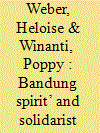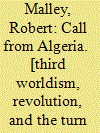|
|
|
Sort Order |
|
|
|
Items / Page
|
|
|
|
|
|
|
| Srl | Item |
| 1 |
ID:
145526


|
|
|
|
|
| Summary/Abstract |
It must come as no surprise that traces of any continuing relevance of the ‘Bandung spirit’ are enthusiastically being sought in the wake of the sixtieth anniversary of the Asian-African Conference. It was the first high-profile formal conference of newly independent (or ‘about-to-be independent’) post-colonial states at a rather momentous historical conjuncture: the continuing struggles for decolonisation were pronounced in the context of the Cold War. The Final Communiqué of the Bandung conference strongly articulated a collective political project against colonialism and imperialism, and for self-determination and racial equality, while already laying the foundations for the idea of strategic non-alignment in the context of the Cold War. It is in this sense that the Bandung conference has come to be emblematic of an event that inaugurated a radically different international political landscape to the immediate post-1945 world order. In this article, the authors focus specifically on the development aspirations articulated at the Asian-African Conference in Bandung, which they argue are the site of struggles and contradictions. As the authors show, the ‘Bandung spirit’ underlined the political project of Third Worldism, as well as the call for a new international economic order in the 1970s. Yet, they also identify some constraints and contradictions that the ‘Bandung spirit’ had to navigate and the challenges it was up against. In the final part of the article, the authors briefly discuss the extent to which the ‘Bandung spirit’ continues to resonate in contemporary global politics of development.
|
|
|
|
|
|
|
|
|
|
|
|
|
|
|
|
| 2 |
ID:
140665


|
|
|
|
|
| Publication |
Berkeley, University of California Press, 1996.
|
| Description |
x, 323p.hbk
|
| Standard Number |
0520203003
|
|
|
|
|
|
|
|
|
|
|
|
Copies: C:1/I:0,R:0,Q:0
Circulation
| Accession# | Call# | Current Location | Status | Policy | Location |
| 040057 | 965.05/MAL 040057 | Main | On Shelf | General | |
|
|
|
|
| 3 |
ID:
164826


|
|
|
|
|
| Summary/Abstract |
In this article, we draw on the contradictions in, and the geopolitics of, international election observation in the Democratic Republic of the Congo’s 2006 and 2011 elections to identify and analyse the emergence of a neo-third world behaviour among African states intended to counter the excesses of Western liberal democracy promotion on the continent. We argue that the decision by African states to quickly endorse the 2011 elections and close ranks around Joseph Kabila’s government, amidst mounting international criticisms of the electoral process, should be understood in the context of a new form of third worldism that is emerging in the global South in response to the unrestrained exercise of US power.
|
|
|
|
|
|
|
|
|
|
|
|
|
|
|
|
| 4 |
ID:
167656


|
|
|
|
|
| Summary/Abstract |
This article re-examines Third Worldism as a political ideology, with a specific focus on a number of Algerian intellectuals. By taking Algeria as a privileged locus of investigation, the discussion zooms into a specific context of Third Worldism, the Algerian War and the decade after, therefore focusing on the period between the 1950s and the 1970s. Here I understand Third Worldism to mean more than the instantiation of the postcolonial state through anticolonial liberation struggles. Rather, I take into consideration (Algerian) voices that push against the rigid boundaries of methodological nationalism and postcolonial theory. By embracing the ethos of ‘affirmative critique,’ the analysis aims to bring to light those ‘forgotten, hidden or invisible acts of critique’ that expose under-currents of Third Worldism not usually discussed or engaged. Thus, I engage writings of rarely considered Third World intellectuals, such as Kateb Yacine, Jean Amrouche, Jean Senac. These are all Algerian intellectuals; the reason behind this focus is the following: their involvement in Algeria’s decolonization struggles translated into translocal solidarity with other decolonization projects, whether in Vietnam or in Palestine. Aside from gesturing toward a translocal spatiality, their writings also embody a more genuine retrieval of dignity by the colonized, and an alternative memory of a different Algerian nation, intrinsically plural and hospitable to difference. Put differently, these voices both attempt a kind of diagnosis (however partial and incomplete) for the reductionism into which the Third World liberation state (inevitably) fell, while suggesting an alternative political horizon that comes closer to Fanon’s idea of ‘national consciousness’, especially in its attention to the ‘international dimension.’1
|
|
|
|
|
|
|
|
|
|
|
|
|
|
|
|
|
|
|
|
|